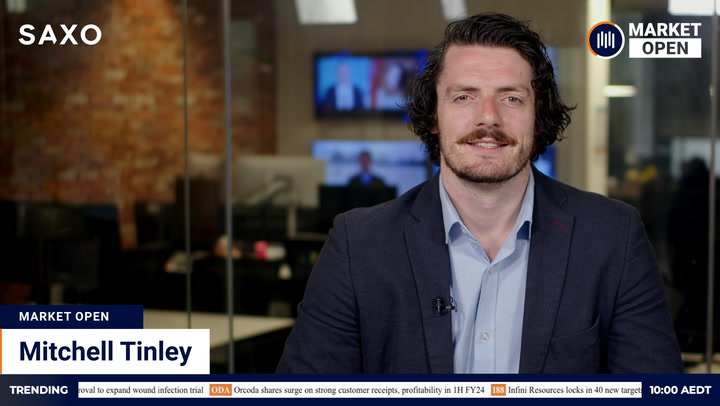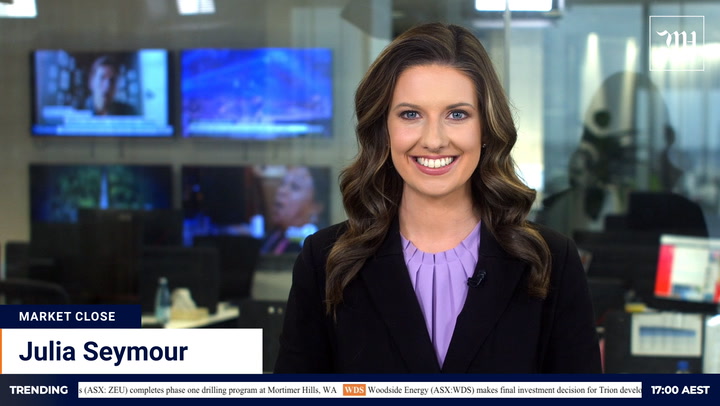The share market fell for a third session as the hottest inflation report in more than 20 years increased the odds of a rate rise next week.
The S&P/ASX 200 dropped 57 points or 0.78 per cent to its lowest close in almost six weeks. The index finished at 7261 after trading as low as 7233.
Gains in energy producers, property stocks and the major miners helped offset declines in banking and tech stocks.
What moved the market
Next week’s Reserve Bank meeting looks like a nail-biter after official data showed the cost of living rose this year at the fastest pace since 2020. Consumer prices surged 2.1 per cent through the first three months. Headline annual inflation hit 5.1 per cent.
Core inflation, the RBA’s preferred measure, jumped to 3.7 per cent. The data increased the likelihood that the bank may have to raise the cash rate in the middle of a federal election.
“Core inflation is now 70bp above the RBA’s 2-3% target band, and the quarterly gain is the strongest movement since the series began in 2002. The annual trimmed mean was the highest since 2009,” City Index market analyst Tony Sycamore said.
“The stunning beat increases the chances that the RBA will raise interest rates by 15bp at its monthly board meeting next week for the first time since 2010, just three weeks before a Federal Election.”
Economists were divided on whether the bank will pull the trigger. ANZ, NAB, AMP, Deutsche Bank, JPMorgan Chase, RBC Capital and Ernst and Young said they expect the bank to lift. CBA and Goldman Sachs anticipate the bank will hold off until June.
The market briefly shed more than 20 points when the report dropped, before regaining most of its loss. The dollar bounced 0.4 per cent to 71.72 US cents. Bond yields climbed in anticipation official rates will rise.
Today’s drop extended the ASX 200’s loss for the year to 2.4 per cent.
“The year 2022 has certainly not been a pleasant ride for the Australian share market,” Kunal Sawhney, chief executive at research group Kalkine, said. “Australian stocks have faced several headwinds this year, including inflationary pressures, interest rate hike fears, concerns around the Russia-Ukraine war and now setbacks from COVID-19 lockdowns in China.”
Today’s tumble followed heavy overnight losses on Wall Street. The Nasdaq Composite plunged almost 4 per cent, its biggest decline since 2020. The S&P 500 shed 2.81 per cent.
The ASX finished off its low as US futures hinted at a rebound tonight. S&P 500 futures firmed 21 points or 0.5 per cent. Dow futures bounced 238 points or 0.72 per cent.
Winners’ circle
Energy producers and some of the major miners rebounded after Chinese authorities pledged further support for the economy. The news helped stem heavy selling in crude, iron ore and base metals through the first half of the week.
Fortescue Metals climbed 1.72 per cent, Santos 1.03 per cent and Woodside Petroleum 1.01 per cent. BHP firmed 0.77 per cent. Rio Tinto inched up 0.18 per cent.
Further down the food chain, Whitehaven Coal improved 5.45 per cent, Champion Iron 3.39 per cent and South32 3.14 per cent.
In the property space, Goodman gained 0.47 per cent, SCA 2.3 per cent and Centuria Capital 2.3 per cent.
Downer EDI rallied 4.72 per cent as shareholders warmed to an investor day presentation.
City Chic Collective bounced 5.38 per cent off an 18-month low on news online sales increased by 77 per cent across the first half. Total sales were 25 per cent higher than the prior corresponding period.
Doghouse
Growth stocks felt the heat from the threat of higher rates. PointsBet skidded 8.61 per cent. Afterpay owner Block lost 5.91 per cent. Zip Co gave up 5.14 per cent.
Mobile app-maker Life360 slumped 29.4 per cent after scrapping plans to list in the US. The tech safety specialist said preparations for a dual listing had ended due to “the change in the market conditions”.
Gold Road Resources dipped 0.96 per cent after reaffirming full-year production guidance. Improving head grades helped the miner increase production and generate $85.4 million in sales revenue last quarter.
Northern Star slid 5.39 per cent after forecasting lower production and higher costs at its Pogo mine. The miner also reaffirmed full-year production guidance.
The surprise resignation of CEO Andre Reich drove The Reject Shop down 21.57 per cent to its lowest in almost two years. The discount retailer said Reich would stand down immediately to “pursue other opportunities”. Chief Financial Officer Clinton Cahn will act as CEO.
Paul O’Malley will succeed Catherine Livingstone as chair of the Commonwealth Bank‘s board of directors. The bank announced Livingstone will retire in August. The share price dipped 1.67 per cent.
Other markets
Mainland Chinese stocks shook off early weakness. The Shanghai Composite bounced 2.02 per cent. Hong Kong’s Hang Seng climbed 0.48 per cent. The Asia Dow shed 1.02 per cent and Japan’s Nikkei 1.23 per cent.
Oil added to overnight gains. Brent crude firmed 47 US cents or 0.45 per cent to US$105.08 a barrel.
Gold fell US$4.10 or 0.2 per cent to US$1,900 an ounce.





